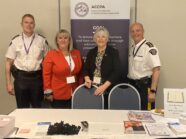

2023 CONFERENCE PHOTOS
MESSAGE FROM THE CONFERENCE CHAIR
Welcome to the official site for ACCPA’s 2023 conference! The conference will be held May 1 - 3, 2023 in Edmonton at the Delta Hotels Edmonton South Conference Centre.
Our theme for this year is Safer Committees Embracing Connectivity, Health & Innovation. We’ve lined up an array of workshops and sessions presented by speakers who are all outstanding experts in their fields.
One of our top priorities has always been to ensure that our conference appeals to both a rural and urban audience. When it comes to community safety, we’re all in this together.
Check out our full conference program and register today. I look forward to seeing you May 1 - 3, 2023 in Edmonton!
Warmest regards,
Gary Cromwell
Chair, 2023 ACCPA Conference
Alberta Community Crime Prevention Association
FOR IMMEDIATE RELEASE CONTACT: Gary Cromwell
Conference Chair
780.297.0351
2023 Community Crime Prevention Conference in Edmonton
The Alberta Community Crime Prevention Association (ACCPA) is holding its 2023 conference in Edmonton from May 1st - 3rd, 2023. The conference sessions and topics are designed to appeal to both rural and urban delegates. The theme of our 2023 conference is Safer Communities Embracing Connectivity, Health and Innovation.
Featuring both national and international presenters, delegates are sure to be impressed by the scope of the sessions. For instance, one of our full-day workshops is accepting images and police reports from delegates regarding problematic issues in local communities. The presenter will then share their assessments and recommendations live in the workshop.
An issue that is common to communities worldwide is the cost of policing. Domestic violence is another common issue with wide-reaching effects. We have world-class presenters who will speak to these issues and so much more. Please check out our Program below to see the fill lineup of our workshops and sessions.
ACCPA provides our membership and the general public with an understanding of community safety and wellbeing through training, and various programs and events. Our membership comprises rural and urban communities, police agencies, and Metis and Indigenous groups.
CONFERENCE TESTIMONIALS
Excellent conference. Well organized and a great diversity of speakers. Thank you.
My first time attending. Great conference. On point with today’s rural crime. Thanks
The presenters were simply outstanding and I loved the format of the sessions (different angles) and the fact that industry partners and business were included. Crime prevention is complex and you nailed the fact that there are so many stakeholders.
Varied conference topics around a central theme. Speakers who are open to more discussions during and after the conference.
I found it all valuable, something for everybody (urban-rural)….. Great job. Thanks for all your hard work.
The presentations about technology – they fit in all areas, especially rural.
Hearing about success stories in other communities. Good ideas for people from the outside!
PRE-CONFERENCE WORKSHOP SCHEDULE
ACCPA is pleased to offer training and educational workshops om May 1 as part of the 2023 ACCPA Conference. Workshops may be taken alone, or in conjunction with the conference. Workshops are designed and delivered by experts and practitioners in the field of crime prevention and community safety. ACCPA’s goal is to support agencies, groups and individuals in their journey to reduce crime and deliver safety in the communities and neighbourhoods in which we live, play and work.
Individuals may register for one workshop alone, or in combination with the plenary sessions of the ACCPA Conference taking place May 2-3, 2023. Please consult the conference Registration Pricing tab for registration options. At the completion of the workshop, participants will receive (digitally) a co-branded Certificate of Completion from ACCPA and the delivering organization.
Please click on the title of a Pre-Conference Workshop or the facilitator's name for a detailed description of program and instructor biographies.
Monday MAY 1 Pre-Conference Workshop
MON 7:30AM
PRE-CONFERENCE WORKSHOP REGISTRATION / CATERED NETWORKING BREAKFAST
MON 8:00AM
Workshop #1 / 1-Day Workshop
Oliver Fisher, Rural Policing Inspector, Sussex UK Police
Workshop #2 / 1-Day Workshop
Greg Smith, Principal of Urban Security Innovation Inc
Kimberly Shaw, Provincial Security at Government of Alberta
Mark Kay, ACCPA Director and Consultant in CPTED, Critical Infrastructure Protection and Disaster Recovery
SPECIAL INSTRUCTIONS:
AT LEAST 30 DAYS PRIOR TO THE WORKSHOP, registered delegates are requested to submit photos, plans, Google Earth images, police reports, notes, etc. – of problematic or challenging places in delegates' communities. The workshop facilitators will share their assessments and recommendations for the submitted places during the workshop. Please submit materials to connect@albertacrimeprevention.com stating in the subject line: CPTED Clinic Materials – [name and community of registered delegate]
Workshop #3 / 1-Day Workshop
Rob Van Gastel, Law Enforcement Liaison, Calgary Youth Justice Society
Cst. Kirby Adolph, Youth Diversion Coordinator, Calgary Police Service
Det. Kendall Booth, Edmonton Police Service
Denise Blair, Calgary Youth Justice Society
MON 12:00PM
CATERED NETWORKING LUNCH
MON 1:00PM
CONTINUATION OF WORKSHOPS #1, #2, #3
MON 4:00PM
END OF PRE-CONFERENCE WORKSHOPS
Presentation of Certificates of Completion
CONFERENCE SCHEDULE
Tuesday MAY 2 Conference
TUE 7:30AM
REGISTRATION / CATERED NETWORKING BREAKFAST
TUE 8:00AM
OPENING CEREMONIES
TUE 8:30AM
Inspector Oliver Fisher, Sussex Police, United Kingdom
TUE 9:30AM
STREAM 1 - Urban Focus
STREAM 2 - Rural Focus
TUE 9:45AM
Julie Nanson-Ashton, Executive Director at the Central Alberta FASD Society
Alhan Yazdani, Graduate Research Assistant, Department of Sociology, University of Calgary
TUE 10:30AM
BREAK
TUE 10:45AM
James Hueser, Sexual Violence Educator, Calgary Communities Against Sexual Abuse
Kasra Hakimattar, Sexual Violence Educator, Calgary Communities Against Sexual Abuse
S/SGT Chris Smiley, Alberta RCMP
TUE 11:30PM
CATERED NETWORKING LUNCH
TUE 12:30PM
Christy Morin, Executive Director, Arts on the Ave
Graham Baartman, Edmonton Police Service
Geoff Dyer, Partner | Urban Design Lead, B&A Planning Design Engagement, Calgary, AB
TUE 1:15PM
BREAK
TUE 1:30PM
Ellie Sasseville, Executive Director, Kingsway Business District Association
Superintendent Mike McCauley , Alberta RCMP
TUE 2:15PM
COFFEE BREAK
SPONSORED BY THE NORTHERN SUNRISE RURAL CRIME WATCH
TUE 2:30PM
Cpl. Diana Stratton, Alberta RCMP
Kendra Sieben, R.S.W, Safe Communities Facilitator
Brooks RCMP - Community Policing Unit
TUE 3:15PM
DAY 1 WRAP-UP - ACCPA
TUE 7:00PM
NETWORKING NEXUS - TOP OF THE INN
WEDNESDAY MAY 3 Conference
WED 7:30AM
REGISTRATION / CATERED NETWORKING BREAKFAST
WED 8:00AM
DAY 2 - HOUSEKEEPING
WED 8:15AM
Karen Gosbee, Author, 'A Perfect Nightmare'
WED 9:15AM
BREAK
STREAM 1 - Urban Focus
STREAM 2 - Rural Focus
WED 9:30AM
Mitch Tilden, Public Legal Education Speaker with The Alberta Seventh Step Society
Sharon Mailloux, Registered Psychologist, Indigo Counselling and Consulting
WED 10:30AM
Cyndi Le, Supervisor - Community Initiatives, Family Centre, Edmonton
Lawrence Jansen, Community and Education Coordinator, Edmonton Police Service
Connie Marciniuk, Community Safety Liaison, City of Edmonton
Edna Pezard-Ramirez, PhD, Paris, France
Virtual Presentation
WED 11:30PM
CATERED NETWORKING LUNCH
WED 12:30PM
Kassidy Green, Boyle Street Community Services, Edmonton
Rebeccah Marsh, Strategic Research and Innovation Lead, Edmonton Police Service
Natalya Alonso, Assistant Professor in Management and Organization Studies, Beedie School of Business
Kelly Rudyk , It's Logical
April Starr
Daniel Jones
Juli-Symata Stoneberg, Manager, Policy and Program Development Initiatives, Public Safety Canada
Angela Vallely, Team Lead for Western Canada for the Aboriginal Community Safety Planning Initiative, Public Safety Canada
WED 1:30PM
BREAK
WED 1:45PM
Kassidy Green, Boyle Street Community Services, Edmonton
Rebeccah Marsh, Strategic Research and Innovation Lead, Edmonton Police Service
Natalya Alonso, Assistant Professor in Management and Organization Studies, Beedie School of Business
Kelly Rudyk, It's Logical
April Starr
Daniel Jones
Petra Shulz, Co-founder, Moms Stop the Harm
WED 2:45PM
DAY 2 WRAP-UP - ACCPA
2023 ACCPA CONFERENCE & TRAINING PRICING
ONLINE REGISTRATION IS NOW CLOSED
You may still register on-site; payment is required at the time of registration.
EARLY BIRD PRICING
The deadline for Early Bird Pricing has now passed.
REGULAR PRICING
The prices noted in red are the regular prices in effect after March 31, 2023.
ONLINE REGISTRATION ENDS IN:
ACCPA Member
Pricing after March 31
$450
$550
Pre-Conference Workshop (May 1) PLUS Conference May 2-3
$300
$400
Conference Only May 2-3
$300
$400
Pre-Conference Workshop Only May 1
$50
Networking Nexus
Non-Member
Pricing after March 31
$500
$650
Pre-Conference Workshop (May 1) PLUS Conference May 2-3
$350
$500
Conference Only May 2-3
$350
$500
Pre-Conference Workshop Only May 1
$50
Networking Nexus
PRE-CONFERENCE NOTES
- The Pre-Conference cost or portion thereof is for any one of the Pre-Conference Workshops. At time of registration please indicate your reservation for a Workshop.
- The Titles and Descriptions of the Pre-Conference Workshops can be found on the Workshop Schedule under the Pre-Conference Training button at the top of the Conference Page.
If you need to modify or cancel your registration, please contact the ACCPA Administrator via email (administrator@albertacrimeprevention.com). There is a cancellation fee of $100 to cancel conference registration by April 14, 2023. There is a cancellation fee of $50 to cancel a workshop by April 14, 2023. No refunds will be offered after April 14, 2003.
SPEAKER BIOS
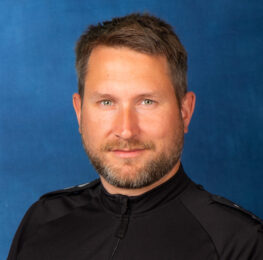
OLIVER FISHER
SESSION: KEYNOTE; SUSSEX POLICE RURAL CRIME STRATEGY: EXCELLENCE IN RURAL CRIME PREVENTION IN THE UK
Tuesday, May 2 at 8:30 AM
Inspector Oli Fisher joined Sussex Police in 2003, where he currently serves as Inspector of the Sussex Rural Crime Team. The Sussex Rural Crime Team is new for Sussex, and one of the few in the United Kingdom. Where rural policing is very different from urban crime fighting, his Team's strength is derived from its successes in community engagement and working partnerships. During his time with the Rural Crime Team, Inspector Fisher's focus has been to develop productive relationships with partner agencies and stakeholders not just in Sussex, but throughout the region.
Prior to joining the Rural Crime Team, Inspector Fisher served in leadership roles ranging from change programs to incident management. As a Force Incident Manager, he worked in the Sussex Police control room, taking command of high threat situations, such as firearms incidents, kidnappings, police pursuits and major incidents. While in Operations Command, he was responsible for preparing Sussex Police for terrorist incidents; coordinating large-scale exercises; and partnering with stakeholder agencies and central government to write response plans for worst case scenarios, such as marauding and chemical attacks.
During a period in Public Protection, Inspector Fisher lead a team that specialized in non-urgent domestic abuse. Launched during the pandemic, his team pioneered the first video consultations for non-urgent domestic abuse victims in the country, enabling the team to reach out to vulnerable victims during COVID lockdowns. As a Police Constable and a Sergeant, Inspector Fisher worked on a number of local policing teams, responding to emergencies, and managing community issues, such as "County Lines" drug dealing.

JULIE NANSON-ASHTON
SESSION: PREVENTION BEST PRACTICE PROGRAMS BY CENTRAL ALBERTA FASD: RESTORATIVE JUSTICE DIVERSION AND IN REACH/OUTREACH AT BOWDEN, DRUMHELLER AND RED DEER REMAND INSTITUTIONS
Tuesday, May 2 at 9:45 AM
Julie Nanson-Ashton is the Executive Director at the Central Alberta FASD Society. Julie is responsible for overseeing the administration, operations, programming, and strategic planning of the organization. Julie has worked in the fields of addiction, mental health, and disability for the past 28 years as a certified counsellor, educator, and senior manager. She has served on numerous boards and committees, including the Etana, Manitoba Health – Leading Change Program, collaborating with senior level regional health and government leaders, to inform evidence-based changes to the Manitoba Healthcare system.
Julie has led teams of up to four hundred employees and volunteers in the advancement of organization and program development, achieved through evidence-based research practices and evaluation techniques, resulting in high quality client care.
Julie is a trained Restorative Practices facilitator through the International Institute of Restorative Practices. She possesses a Graduate Certificate in Restorative Practices and is a candidate for the Master of Science in Restorative Practices.
Fetal Alcohol Spectrum Disorder (FASD) is a medical diagnostic term used to describe impacts on the brain and body of individuals prenatally exposed to alcohol. It is a lifelong disability and often referred to as an invisible disability. Due to a host of factors including the deficits caused by this disability, evidence-based research confirms that a disproportionate number of individuals with FASD are represented in the criminal justice system (CJS). The FASD Restorative Justice Diversion Program (FASD RD Program) was initiated in 2020 as a partnership with the Red Deer RCMP Community Policing and Victim Services unit (CPVS), the Crown Prosecutor’s office, and various invested stakeholders. The program targets individuals suspected or impacted by FASD that have frequent interactions with RCMP, are at risk of criminal charges or victimization, have current criminal charges in the CJS, or are at risk of breaching court ordered conditions, such as probation/parole. Julie Nanson-Ashton will present on the FASD RD Program, the successes gained over the past 2.5 years, and the critical role that Restorative Practices played in the program’s trajectory.

Alhan Yazdani
SESSION: A COMPARISON OF RESTORATIVE JUSTICE PROGRAMS ACROSS CANADA
Tuesday, May 2 at 9:45 AM
Alhan Yazdani graduated from the University of Calgary with a Master of Arts in Sociology. She has always been interested in understanding the effectiveness of the Canadian legal system in deterring youth who have come into contact with the criminal justice system. Restorative justice has become central to Canada's responses to youth crime, especially under the Youth Criminal Justice Act (YCJA), which emphasizes significant alternative responses to the formal criminal justice system. Restorative justice offers benefits that are argued to instill more robust cognitive transformation (i.e. a change in thinking about one's actions in relation to a crime and the harm it caused particular parties and the wider community), and ultimately helps instill safer communities and prevent crime. Research on restorative justice, however, often neglects to understand the challenges of implementing restorative justice programs, especially in rural Canadian Communities where they face unique challenges and have limited resources compared to urban communities. Alhan will shed some light on this gap in knowledge by comparing restorative justice programs in British Columbia, Alberta and the Atlantic provinces.
Restorative justice has become central to Canada's responses to youth crime, especially under the Youth Criminal Justice Act (YCJA), which emphasizes significant alternative responses to the formal criminal justice system (Tomporowski et al., 2011). Restorative justice offers benefits that are argued to instill more robust cognitive transformation (i.e. a change in thinking about one's actions in relation to a crime and the harm it caused particular parties and the wider community), and ultimately helps to instill safer communities and prevent crime (LeBel et al., 2008). In relation to youth crime in Canada, restorative justice plays a prominent role under the YCJA. Yet not all provinces have implemented restorative justice programs to the same degree. This will be highlighted in my presentation by examining programs from three different Canadian provinces, including British Columbia, Alberta, and the Atlantic provinces. Specifically, this will entail examining some of the benefits of the programs, how the different programs are implemented, and some of the shared challenges. The tensions between formal and informal approaches to responding to crime are highlighted, as well as how these tensions lead to role ambiguity and other obstacles. Shedding light on restorative justice programs, their challenges, and opportunities for improvement will help provide crucial knowledge to inform best practices going forward and ultimately benefit all parties involved, as well as the wider community.


JAMES HUESER, Kasra Hakimattar
SESSION: HOW MEN AND BOYS CAN CHANGE DOMESTIC VIOLENCE
Tuesday, May 2 at 10:45 AM
After working for 7 years within the oil and gas industry, I began volunteering at CCASA through the Support and Information Line and found my passion for educating and facilitating workshops related to sexual violence. With a B.Sc. in Geology, my education on the topic has been largely informal and based on the stories and experiences that have been shared with me
by friends and colleagues, callers using the Support and Information Line, and the vast number of testimonials found on social media. When it comes to making material geared towards men and boys, I work to create content that is relevant and relatable while remaining challenging and informative. Most recently I have been highly engaged with Hockey Canada facilitating workshops to all of their hockey teams stressing the ways that each participant can contribute to a culture change within their sport and lives.
kasra started his career with an undergraduate degree in biomedical sciences before becoming interested in sexual violence prevention. He first gained experience in this area by volunteering with CCASA's Support and Information Line, providing support and resources to individuals who have experienced sexual violence. After a few years of volunteering and completing his Masters of Social Work, he joined CCASA's education team where he works in a variety of portfolios, including men's management, while offering a clinical perspective to the education he provides.
Research states that men and boys are vital to reducing and ending sexual and gender-based violence in our communities, given that the roots of this violence stem from attitudes enforcing gender inequality. Researchers also indicated that when witnessing or responding to an instance of domestic violence, many men lack the knowledge and skills to intervene effectively. Throughout this session we analyze and answer the question of how can men and boys change domestic violence while proposing a new question to participants: what are men and boys willing to do to reduce and end domestic violence? We will highlight and examine barriers that inhibit men and boys" ability to support and be engaged on this issue, and provide education through a trauma-informed lens to enhance men and boys" capability to affect change on this issue in their daily lives.
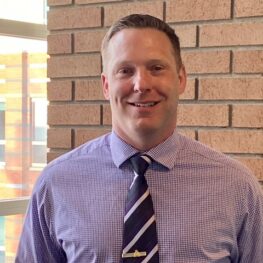
S/SGT CHRIS SMILEY
SESSION: REGIONAL POLICE AND CRISIS TEAMS (RPACT)
Tuesday, May 2 at 10:45 AM
Staff Sergeant Chris Smiley is in charge of Alberta's Regional Police and Crisis Teams (RPACT) program within the K Division Community Safety and Well-being branch. Chris has 19 years of
service with the RCMP, serving in communities in Eastern and Central Alberta Districts. Prior to leading RPACT, Chris was the Detachment Commander at the Ponoka Detachment where he prioritized collaboration with heath partners. Chris believes that areas where heath care and police overlap are high risk for both agencies and serve our most vulnerable citizens. Chris is dedicated to examining and challenging systems to better serve this population and support the safety of front-line police and health care employees.
RPACT is the collaboration with the RCMP and Alberta Health Services creating a mobile crisis team consisting of a uniformed RCMP officer and a Mental Health Therapist/ nurse. RPACT is able to intervene, assess, and support adults in the community experiencing a mental health crisis via in-person attendance or consultation by phone or police radio.
RPACT was developed for the purposes of:
- Reducing inpatient admissions and hospital emergency visits for adults in crisis;
- Rapid stabilization and return to pre-crisis functioning for the adult in crisis;
- Providing the most appropriate support response, thereby reducing police-only involvement in mental health emergencies; and
- Establishing connections for clients with important community supports.
In addition to the RPACT program, police in Alberta have additional supports for the frontline officers when responding to mental health crisis. These include the province wide roll out of the HealthIM application and the provincial law enforcement phone line.
Used in multiple Canadian jurisdictions, the HealthIM system is a digital platform that provides police officers with the onsite tools and information they need to improve safety for all involved. It can help in assessing whether a person should be transported to a designated facility for evaluation and connect the individual to community service providers if further intervention is not warranted.
After extensive discussion with many of Alberta's smaller municipal police agencies and rural RCMP detachments, a need was identified to support frontline members when attending mental health calls for service. The law enforcement consultation provides law enforcement with the resources to triage mental health related calls for service with an AHS Mental Health Clinician. The designated telephone number will place law enforcement partners into a priority queue that will allow them to triage the mental health elements involved in a call for service and will assist police in determining whether to bring an individual to hospital, or to offer an
alternative community referral.


CHRISTY MORIN & GRAHAM BAARTMAN
SESSION: GREEN ALLEYS EDMONTON
Tuesday, May 2 at 12:30 PM
Christy is the founder and Executive Director of the grassroots community arts organization “Arts on the Ave”—a charity that is focused on the revitalization of Alberta Avenue. Under her leadership the organization has grown to produce two signature festivals, Kaleido Family Arts Festival and Deep Freeze: A Byzantine Winter Festival, that continue to have a significant impact in the Edmonton Region.
Christy serves on the board of directors for a number of organizations including the Alberta Community Crime Prevention Association, Northlands, and the Alberta Avenue Business Association. She also sits on the City of Edmonton Canada 150 Celebrations and Events Subcommittee, the Edmonton Festival Consortium, and the Edmonton WinterCity Advisory Council.
As a community leader she was named a Paul Harris Fellow of Rotary International and has received numerous awards and distinctions, including the Harry Hole Community Policing award and the Queen Elizabeth II Diamond Jubilee Medal in 2012.
Christy was named a Global Woman of Vision, and was one of Edmonton's Top 40 under 40 and one of the top 100 Edmonton women in business.
Recent speaking engagements include the Alberta Community Crime Prevention Association Conference (Calgary, 2016), Tamarack: An Institute for Community Engagement (Edmonton, 2016), Capital Region Summit (Edmonton, 2015), Keynote Speaker, Make Something.
Senior Constable Graham Baartman is a 14-year member of the Edmonton Police Service (EPS). He was born and raised in Johannesburg, South Africa and has a diverse and extensive law enforcement background. After completing 2-years of mandatory military service as an Army Paratrooper in the South African Defence Force, Graham worked as a Game Ranger in wildlife
management and law enforcement for 17 years. Graham had the privilege of working in Zululand on the Mozambican Coastal Plain and in the mountains in the northeast part of South Africa during this time. Part of this job included meeting with tribal communities; often in conflict due to political movements, faction fighting and land claims. He was also a member of an anti-poaching unit specializing in Rhino protection – a critically endangered species in Africa.
In 2009, Graham decided to escape the heat and immigrated to Canada, when he was accepted as an international applicant with the EPS. Graham has worked in various areas across the service including Specialized Traffic Section, Patrol and in the community beat where he’s been for the last two years.
We are thrilled to announce our upcoming session on Green Alleys Edmonton, a ground-breaking project initiated by Arts on the Ave Edmonton to tackle the safety concerns in our neighbourhood alleys. The project was born out of crisis when our neighbours no longer felt secure in their backyards due to the misuse of the alleyways for illegal activities. However, with the help of the community, Edmonton Police Service, and 10 other stakeholder groups, we
established this project during the 2020 pandemic, and we have been successful in making our alleys safer and more welcoming places.
We believe that the learnings and experiences from working in alleys with neighbours and partners can be easily applied to both rural and urban settings. In this session, our experienced team, with over 60 years of experience from South Africa to Edmonton, will share their tactics and tools for transforming gritty alley spaces into vibrant community areas. Join us to learn more about how you can be part of this exciting initiative and make a positive impact on your community.

GEOFF DYER
SESSION: THE URBANISM OF SAFE AND VIBRANT COMMUNITY DESIGN
Tuesday, May 2 at 12:30 PM
An accomplished urban designer, Geoff Dyer joined B&A as a strategic design lead in 2018 after serving five years as the Director of Design and CEO for the Downtown Development Authority in Lafayette, Louisiana. He was previously the Principal and Director of Design for Placemakers LLC, and the Owner and Principal of Placemakers Canada Inc, where he ran a successful Alberta-based urban design firm focused exclusively on the design and implementation of walkable, mixed-use urbanism. Spanning a decade, he completed over 100 projects in 18 U.S. States and four Canadian Provinces, earning him two Charter Awards and a place on the 2008 Charter Award Jury chaired by Andres Duany and eventually serving as Jury Chair himself in both 2020 and 2021. Geoff is a regular educator, lecturer and writer on sustainable urbanism, urban design and alternative land use regulations and development standards.

ELLIE SASSEVILLE
Tuesday, May 2 at 1:30 PM
Ellie Sasseville is a 25 year Executive Director having worked with Chambers of Commerce in Northern Canada and the past 10 years with the Edmonton Kingsway District Business Improvement Area.
In this session we will talk about and share the challenges of balancing business needs, community needs with compassion and wellbeing for everyone. This is paramount to ensuring
success for businesses to thrive in areas where the most vulnerable seem to have taken over. Where can we and where do we draw the line for business owner's rights to operate. The way forward is housing, social supports, money and even accountability. Let's talk about what we do while we wait for these solutions.

Superintendent Mike McCauley
SESSION: Community Safety & Well-being Strategy in Dealing with Root Causes of Social Harm
Tuesday, May 2 at 1:30 PM
Superintendent Mike McCauley is the Officer in Charge of Engagement and Outreach for the
Community Safety and Well-being Branch of the Alberta RCMP. He has over 20 years of service working in various communities and capacities across British Columbia and Alberta. Most recently he was the Officer in Charge of Fort Saskatchewan Detachment where he made relationships with the outlying rural communities his priority. His current focus is to reduce crime and community harm, while increasing community safety across Alberta through strategic partnerships and community capacity building.
To address modern policing needs, the RCMP launched their new branch "Community Safety and Well-being" at "K" Division on September 1, 2022. The branch is unique and the first of its kind in Canada. The Community Safety and Well-being Branch operates under four pillars: crime reduction, community outreach, analytics and intelligence, and social engagement. It is essentially an organizational restructuring that puts existing units – such as data analytics, Indigenous relations, crisis teams and crime-reduction units – under the same administrative umbrella.
Not only does the Community Safety Branch provide more resources on community engagement at no additional cost, but the organization also allows for the creation of new
programs targeting specific community needs. The work done by the branch is proactive and interactive with communities. Putting all these critical units together in one branch permits a better stream of information and strategic planning and more inter-operability.

Cpl. Diana Stratton
SESSION: ALBERTA’S INTEGRATED OFFENDER MANAGEMENT INITIATIVE
Tuesday, May 2 at 2:30 PM
Corporal Diana Stratton works in the Integrated Offender Management (IOM) Unit for Central Alberta District of the RCMP. She is in her 14th year of service and has worked in frontline
policing in Nova Scotia and rural Alberta. In Integrated Offender Management, she has implemented evidence-based strategies for reducing recidivism in priority offenders. IOM is effective because it addresses the offender’s underlying risks and needs through collaboration with community partners. She advocates for agile offender management strategies of prevention, intervention, targeting, suppression, and enforcement. In her current role, Diana is
responsible for training detachments, engaging with community partners, and expanding IOM across Alberta.
Integrated Offender Management (IOM) is an evidence-based approach to reducing recidivism in Alberta's priority offenders. IOM is rooted in three pillars: Priority Offenders (identified through data and analytics), Risk-Need-Responsivity (a theoretical paradigm to reduce risk to reoffend), and Integration (collaboration/integration with community partners). The success of IOM on a small-scale has led to province-wide implementation in RCMP jurisdictions that include urban, sub-urban, and rural settings. IOM manages offenders using strategies of prevention, intervention, targeting, suppression, and enforcement, while working with community partners who can help address the underlying reasons an offender is committing crime. Cpl. Diana
Stratton will present on the pillars of IOM and share offender journeys of IOM participants.

Kendra sieben
SESSION: ‘Hubbing’ Police Engagement, Social Media, and Crime Prevention
Tuesday, May 2 at 2:30 PM
Kendra completed her education in Social Work in 2019 with a focus on Criminology and
Communications. Her education gave her the opportunity to work with the Red Deer RCMP, Red Deer Victim Services, Central Alberta Child Advocacy Centre, and Central Alberta Sexual Assault Support Centre. Following her graduation, Kendra became a Registered Social Worker and took on the role of Safe Communities Facilitator with the Brooks RCMP. Working for both the City of Brooks and County of Newell, Kendra has largely expanded upon the position and handles all things crime prevention, community safety, and officer engagement.
In May 2021, Kendra was one of the initial members of the Brooks RCMP’s first Community Policing Unit. Kendra is incredibly passionate about the work she gets to do every day for her community, and she is thankful everyday for the talented individuals she works with. She finds it so rewarding to be able to educate such a large audience through social media, and make meaningful connections with those they reach. Kendra is a firm believer in ‘prevention over intervention’, and her current role allows her to bring that into focus while working collaboratively with community partners and agencies to develop and implement strategic solutions to reduce crime and victimization.
Kendra has had the pleasure of speaking at the BC RCMP Youth Officer Conference, the RCMP National Youth Officer Training, and has enjoyed acting as a consultant for various detachments and police services across North America. Her ideal outcome of all of these opportunities is for her position to exist in more jurisdictions, so that more detachments and communities can reap the same benefits that Brooks and Newell do.
Crime prevention, active community engagement, and social media/communications are all very important aspects of policing and community safety- we all know that. Many times, it is hard for each individual police detachment/enforcement team to do as much in these areas as they would prefer, whether it be due to lack of time, lack of resources, lack of contacts, or
maybe they just aren’t sure the best way to do it. I want to share what we have created in Brooks and Newell- not only do we have buy-in from our law enforcement and community, we have buy-in on a global scale! We are currently the 2nd highest followed police platform in North America on TikTok! This, among other successes, has allowed us to reach more of our youth and
multicultural community members than ever before.
This presentation is going to show how it is possible to ‘hub’ all of the important pieces of policing into one position to have them organized and facilitated in the most effective and financially beneficial way possible for both your officers and your community- urban or rural. This simple implementation allows for your education and engagement to stay specific to your jurisdiction or municipality while maintaining the same credibility and reliability of a larger authority. It is an efficient use of resources, man-power, and funding that can, if done properly, lessen call volume for first responders and increase collaboration between resources. I can’t wait to share this valuable information with you, and would love to see it implemented in your area.

KAREN GOSBEE
SESSION: KEYNOTE; ADVOCATING FOR DOMESTIC VIOLENCE PREVENTION AND REDUCTION
Wednesday, May 3 at 815 AM
Karen Gosbee is author of the book A Perfect Nightmare. It is the story of a woman's awakening to the realities of her failing marriage and her desperate struggle – one that would end in headlines and tragedy – to bring herself and her children to safety. Karen Gosbee is a community advocate to raise awareness about gender based violence and coercive control, and educate and advocate for prevention and improvements in legislation to eradicate gender
based violence.
As co-chair of Calgary's Community Action on Mental Health and Addiction Stewardship Group, Karen Gosbee supports the 21-member group, leading Calgary's efforts to combat mental health and addictions concerns as part of the city's $25-million strategy. As a priority, the group in collaboration with local stakeholder and with input from the engagement and research activities, is developing a framework which will outline the proposed policy directions, strategic actions, and results that will be sought within Calgary's Community Action on Mental Health and Addiction Strategy.
Supporting a provincially-wide approach to improve access to recovery-oriented mental health and addiction services, Karen serves on a diverse advisory council, helping develop and deliver recommendations for policy changes. Further, Karen's taken on a role as part of a collective with
IIMHL, contributing to the ground-breaking initiative I-Circle, to support mental health and well-being within urban settings.
Through lived experience, Karen became a community advocate for mental health, addiction, and domestic violence. Karen is involved with a city-wide task force for The City of Calgary that is aimed at improving mental health and addiction concerns and provincially is a mental health advisory council member. Karen is the author of a best seller book, titled 'A Perfect Nightmare: My Glittering Marriage and How It Almost Cost Me My Life'. Her goal in sharing her story is to educate others about mental health, addiction, domestic violence and more specifically coercive control. She hopes that by sharing her experiences, she can help others in similar situations and create change on a systemic level.
Her Objective is to: to bring further attention to coercive control and reduce the stigma through education and awareness.

MITCH TILDEN
SESSION: Seven Steps to Freedom: Realistic Thinking
Wednesday, May 3 at 930 AM
Mitch's presentation tells a story about the experience of a broken family, athletic success, substance abuse, lost hope, and shattered dreams which led to a criminal lifestyle. Discussing missed opportunities by way of the descent from being a Junior Olympic gold medal athlete to a federal penitentiary inmate with 29 criminal convictions and nearly a decade incarcerated. The battle of poor decisions, unhealthy relationships, self-defeating attitude and distorted thinking strengthened Mitch's addiction. Mitch will talk about his upbringing and how his choices led to his addiction and the criminal lifestyle which almost cost Mitch his life when a murder attempt was made. Mitch will talk about how this lifestyle affected his family and the numerous bridges that he burnt. He will describe the losses and pain he endured and how he finally started to see the truth about his addiction and accepted he needed to change. Mitch was able to let go, face
the truth about himself and stop doing the same thing over and over, expecting a different result. Mitch realized he needed to stop running his life based on his own distorted thinking and that the only way to attain any success was by accepting help and putting in effort towards personal change.


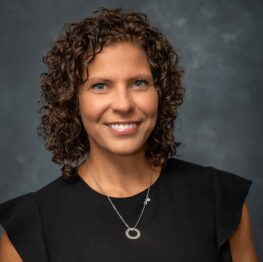
CYNDI LE, LAWRENCE JANSEN, CONNIE MARCINIUK
SESSION: the Importance of Partnerships in Community Safety Responses
Wednesday, May 3 at 1030 AM
In 2009, Cyndi began her journey with Family Support Services at The Family Centre where she walked alongside vulnerable families and youth in their healing journey while supporting their connection to community. She joined Neighbourhood Empowerment Team in 2022, supervising Youth Liaisons. She is passionate about creating better outcomes for youth, for youth to feel safe and empowered, amplifying youth's voices, and for youth to have a sense of belonging to their community. Cyndi believes everyone has a role to play in community safety responses and that collaboration leads to the most innovative and sustainable solutions.
Lawrence has been working with the Edmonton Police Service (EPS) for 18 years, engaging communities and individuals by providing community safety and crime prevention support and resources. as the EPS's Neighbourhood Empowerment Team's (NET) liaison, Lawrence connects the appropriate EPS resource to projects and issues that NET is working on. Lawrence strongly believes that collaboration is critical for making communities safe places.
Connie has always been interested in positively impacting individual well-being and it was when she partnered with NET from an external agency she learned how collaborative work through a community safety lens can help accomplish this goal.
In her over 10 years working with the Neighbourhood Empowerment Team she has had the amazing opportunity to work with diverse groups of individuals, community stakeholders, and agencies. She has contributed to a wide range of projects; some to address property crime and social disorder, some that identify how the physical environment contributes to safety (via Crime Prevention Through Environmental Design), others that align perceptions of safety with the larger sociopolitical context and how a more inclusive community can increase safety. Nowhere else has she found such a unique opportunity to connect with people, hear their perceptions on what impacts safety then work together to address these factors.
Although Connie has always lived in Edmonton in recent years she finally accepted the cold weather and added cross country skiing and snowboarding to the list of outdoor activities she enjoys including hiking, biking and camping that she does with her family and friends.
What do elementary children, firefighters, seniors centres, grocery stores and libraries have to do with community safety? More than you may think.
Whatever your role in the community is, you can impact safety by being the one who brings people together and help find solutions. This presentation highlights how to intentionally mobilize stakeholders to utilize resources and expertise to help address community safety concerns in an innovative, meaningful and effective way.
The presenters will share examples of how they have worked with a variety of partners to impact change.

EDNA PEZARD-RAMIREZ
SESSION: CITY OF FEAR: FEELINGS OF INSECURITY, DAILY PRACTICES AND PUBLIC SPACE
Wednesday, May 3 at 1030 AM
Edna Pezard Ramirez is an award-winning urban analyst, consultant, researcher, and author, focused on transforming public spaces to make them safer and more humane. With a background in urban affairs, Edna holds a PhD from the Université Paris Cité on feelings of insecurity in the public sphere, with a special focus on vulnerable populations. Edna is also the founder of CITY CITÉ CIUDAD and she has collaborated with European and American municipalities, NGOs, and researchers. Her work has been published and shared on platforms such as the Fondazione Feltrinelli, Oxford Urbanists, the Journal of Public Spaces, the International CPTED Association, and Reflexions Immobilière's.
Concern for security has a direct impact on different levels, from urban form to daily practices, an impact that at times can be subtle. The relationship between feelings of insecurity, public spaces, and daily practices is complex and constantly shifting. City dwellers take cues from the environment and adapt their behavior, feelings of insecurity changes the way in which users perceive, use, and interact with on another in public space.
At the same time, public spaces can be transformed in the name of security. Spaces - a building, a street, a neighborhood or a city - can simultaneously be a source of information, a product, a producer of insecurity, and the subject of transformations for prevention. Physical transformations of urban environments appear to be a solution to reduce crime and keep city dwellers safe. But....are we really making public spaces safer? And if so, for whom?
Stemming from Dr. Pezard's award-winning work as a researcher at the Universite Paris Cite and the CESSMA Laboratory, this presentation will present the relationship between these three elements; public spaces. feelings of insecurity, and daily practices. We will share some of the findings of 5 years of state-of-the-art research and professional experience in Europe and America, and we will take a critical look at spatial transformations in the violent and vulnerable contexts: their possibilities, their limitations and the positive and negative repercussions on the physical and social fabric of the city.





Kassidy Green, Rebeccah Marsh, Natalya Alonso, KELLY RUDYK, april starr, DANIEL JONES
SESSION: PANEL DISCUSSION ON PROFESSIONAL AND INSTITUTIONAL FLEXIBILITY IN THE SCALING OF COMMUNITY SAFETY AND WELL BEING PRACTICE
Wednesday, May 3 at 12:30 PM & 1:45 PM
Kass is a registered social worker, and has been working at Boyle Street since 2019. She has a mix of frontline, leadership and advocacy-based experience. In her role at Boyle Street, she oversees the volunteer program, public education, corporate and community partnerships, and fundraising campaigns and evens. She is focused on building relationships with the broader community in order to help accomplish the organizational mission of ending chronic homelessness and building stronger, more inclusive communities.
Dr Rebeccah Marsh is an accomplished researcher and strategist who currently works in research and innovation at the Edmonton Police Service. A physicist turned system change agent, she has spent her career working to improve outcomes for vulnerable populations. Prior to joining the EPS, Dr Marsh served as a director of research in children’s mental health care. She is a Credentialed Evaluator and an Adjunct Assistant Professor at the University of Alberta.
Natalya Alonso is an Assistant Professor in Management and Organization Studies at Beedie School of Business. She completed her PhD at the University of British Columbia where her studies were partly funded by the Social Sciences and Humanities Research Council of Canada. She works with organizations to solve problems related to diversity, equity, and inclusion, issues she addresses in her research. Her research has been published in leading journals including Organization Science and Journal of Applied Psychology.
Kelly Rudyk is a 30 plus year local government practitioner. He has a passion for high Performance government and believes strongly it is achievable with intentionality and logical decision making.
Kelly was the leader in Strathcona County's implementation of Priority Based Budgeting and in 2017 they received a national award for innovation for the work. PBB has become an integral part of Kelly's current work as the Founder/President of It's Logical Strategic Planning
Services.
Municipal corporate strategic planning, business planning, leadership and change management have been a big part of his work with many AB municipalities. Branching out into the non-profit sector, private marketplace and even family planning are part of future growth plans.
April Starr is a professor and consultant focused on human centered design & innovation with a focus on public safety service design.
She is the former Director of Experience Research at Motorola Solutions where she established an iterative research and design process to ensure software products met the needs of end users prior to development. Foundational to this effort was leading and scaling a multidisciplinary team to understand and model the complex needs of first responders.
April has over 20 years of experience as a leader and practitioner on both the research and design sides. She has worked across a broad range of industries including consumer electronics, automotive, telecommunications, financial services, retail, industrial products, consumer
packaged goods, education, and healthcare. Her expertise is in Service Design--the design of complex human and technology systems towards human-centered outcomes.
April is adjunct faculty at Illinois Institute of Technology's Institute of Design and previously was
a professor at University of Illinois. She holds a Bachelor of Fine Arts in Industrial Design from Carnegie Mellon University and a Master of Design degree from Illinois Institute of Technology's Institute of Design


JULI-Symata STONEBERG, angela vallely
SESSION: PUBLIC SAFETY CANADA: the aboriginal community safety planning initiative
Wednesday, May 3 at 12:30 PM
Juli-Symata Stoneberg is the Manager of the Policy and Program Development Initiatives section (formerly Guns and Gangs Policy) at Public Safety Canada, guiding the federal government's response to gun and gang violence. She brings more than two decades of public servant experience in immigration, intelligence, Indigenous community safety and gang violence policy. Since early 2019, Juli has spent more than three years as a Policy Advisor and now Manager in the Guns and Gangs Policy unit, and one year working as the Senior Policy Advisor, focusing on policy, coordination and research, with the Aboriginal Community Safety Planning Initiative (ACSPI), supporting program delivery in Indigenous communities across Canada in the development of safety and wellness plans in 2022. Channeling her passion for community safety, crime prevention, skill development, and an understanding of federal law enforcement environments, she returned to le ad the PPDI team on the complex, high-profile, high-stakes gun and gang violence policy file. Residing in Michigan and Ontario home since 2000, this Edmontonian and UAlberta graduate always looks forward to a return to Big Sky country!
Angela is a Senior Policy Advisor with Public Safety Canada - Aboriginal Community Safety Planning Initiative (ACSPI). For the past ten years the Aboriginal Community Safety Planning team has been supporting Indigenous communities across Canada in the development of safety and wellness plans. Angela is a member of Fisher River Cree Nation, Manitoba, but currently lives and works in Ottawa, Ontario.
In this uniquely grass-roots approach, Public Safety Canada - Aboriginal Community Safety Planning Initiative (ACSPL) supports Indigenous communities in the development and implementation of Community Safety Plans (CSPs) which are specific to a community's unique circumstance. These plans identify community strengths, assets and safety and wellness goals for all community members to see themselves on a path leading toward a healthier, safer home and community life. ASCPI provides contributions to Indigenous organizations (on and 0ff-reserve), Indigenous governments and municipalities in collaboration with Indigenous organizations and or communities to develop tailored approaches to community safety that are responsive to the concerns, priorities, and circumstance of Indigenous communities. Becoming more responsive requires engaging Indigenous communities in identifying issues and developing solutions; building the capacity of Indigenous communities to develop and deliver projects; addressing funding issues; and ensuring that relevant programs are adaptable to the diverse needs of Indigenous communities.

Petra Shulz
SESSION: THE DRUG POISONING CRISIS - NOT JUST AN URBAN PROBLEM
Wednesday, May 3 at 1:45 PM
Petra Schulz lost her 25-year-old son, Danny, to accidental fentanyl poisoning in 2014. She is one of Moms Stop the Harm co-founders, a network of Canadian families impacted by substance-use-related harms and deaths. Through the lessons learned from her personal experience and by sharing Danny's story, Petra has become an advocate for drug policy reform to reduce the harm associated with substance use. She believes that substance use involves human rights and health and must not be criminalized.
Petra represents families with lived experience in Health Canada and CCSA advisory committees. She has been a speaker for TedX, at rallies, conferences, community meetings, professional organizations, universities, and all government levels. She contributed to the anti-stigma campaign, "See-Beyond" and research projects related to her advocacy work.
Petra Shulz never planned to be a harm reduction advocate, but her life changed forever on April 30, 2014, when her youngest son Danny died from accidental drug poisoning with fentanyl. When faced with what to say in his eulogy, they decided to tell the truth. In this talk, Petra shares Danny's story and the idea that people who used drugs are just like everyone else: people who deserve a chance to be sage and healthy and to live without judgement or shame. Petra also explains why so many people across the country, including those living in rural communities, are dying from an overdoes, which she describes as drug poisoning, and what individuals and communities need to do to change this.
WORKSHOP FACILITATOR BIOS
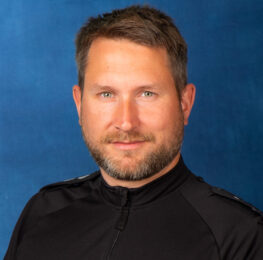
OLIVER FISHER
WORKSHOP 1: RURAL CRIME STRATEGY IN THE UNITED KINGDOM: PARTNERSHIPS AND OPPORTUNITIES FOR ALBERTA AND CANADIAN MUNICIPALITIES
Monday, May 1 at 8:00 AM
Inspector Oli Fisher joined Sussex Police in 2003, where he currently serves as Inspector of the Sussex Rural Crime Team. The Sussex Rural Crime Team is new for Sussex, and one of the few in the United Kingdom. Where rural policing is very different from urban crime fighting, his Team's strength is derived from its successes in community engagement and working partnerships. During his time with the Rural Crime Team, Inspector Fisher's focus has been to develop productive relationships with partner agencies and stakeholders not just in Sussex, but throughout the region.
Prior to joining the Rural Crime Team, Inspector Fisher served in leadership roles ranging from change programs to incident management. As a Force Incident Manager, he worked in the Sussex Police control room, taking command of high threat situations, such as firearms incidents, kidnappings, police pursuits and major incidents. While in Operations Command, he was responsible for preparing Sussex Police for terrorist incidents; coordinating large-scale exercises; and partnering with stakeholder agencies and central government to write response plans for worst case scenarios, such as marauding and chemical attacks.
During a period in Public Protection, Inspector Fisher lead a team that specialized in non-urgent domestic abuse. Launched during the pandemic, his team pioneered the first video consultations for non-urgent domestic abuse victims in the country, enabling the team to reach out to vulnerable victims during COVID lockdowns. As a Police Constable and a Sergeant, Inspector Fisher worked on a number of local policing teams, responding to emergencies, and managing community issues, such as "County Lines" drug dealing.
This workshop will be an interactive overview of the evolution of the Sussex (UK) Police Rural Crime Strategy, including opportunities for Alberta and Canadian rural municipalities. The Sussex strategy provides a framework to help deliver Sussex Police priorities for rural communities, including: keeping communities safe and feeling safe, identifying and protecting vulnerable people, and preventing and responding to harm. The results of the Rural Crime Survey 2018 delivered by the National Rural Crime Network (NRCN) will be examined, which highlighted opportunities for improvement in perceptions of policing in rural communities, and community perspectives on rural crime. The workshop will cover the unique vulnerabilities, challenges and impact factors of rural communities that need to be considered in strategy development. The Sussex Police Local Policing Model will be reviewed in the context of rural crime, including the delivery of three areas of local policing – Prevention, Response and Investigations – in addition to support from regional and national units who together with local policing, collaborate to keep communities safe. The workshop will examine the resourcing of rural crime in Sussex, including the key role of volunteers and partnerships, and the role of the Sussex Police and Crime Commissioner. The workshop will also cover the setting of objectives and measurements of the Sussex Rural Crime Strategy, including: the provision of an effective policing service to the rural community, making rural communities feel safer, building effective partnerships to respond to the needs of rural communities, and increasing the confidence of rural communities in the police.



GREG SMITH, KIMBERLY SHAW, MARK KAY
WORKSHOP 2: CPTED CLINIC OF DELEGATE-SUBMITTED EXAMPLES OF REAL-WORLD, PROBLEM PLACES: REVIEW AND ASSESSMENT OF SUBMISSIONS BY EXPERT PANEL IN CRIME PREVENTION THROUGH ENVIRONMENTAL DESIGN
Monday, May 1 at 8:00 AM
Gregory N. Smith, CPP, CHPA, CPD is the Executive Director of Urban Security Innovation Inc., that offers specialized services in Security Management and Life Safety, Corporate Executive
Protection, Risk Management Services and Physical Security Design. Greg has provided
expertise in security management and physical security to the Finance, Property Management, Construction, and Petroleum, Utility and Healthcare industries for over 27 years.
Numerous private and public CPTED projects successfully completed, notably CPTED Reviews of Edmonton’s Chinatown and McCauley/Boyle neighborhoods, Safe Security Design for all Alberta Health Service Healthcare centres, Houses of Worship safe design in many Alberta
communities and numerous mutli residential projects throughout Alberta.
During his career, Greg has established himself as an innovative leader in security, establishing best practices in Physical Security, Life Safety, and Crime Prevention Programs. Greg has been
recognized for his efforts by Security Magazine for Best Practices in Security in 2004 and a Safety Recognition Award for Best Practices in Parkade Security and Safety by the City of Edmonton and the Edmonton Police; and featured in several newspapers as a local resource in crime prevention.
As an advocate for continuous learning, Greg has attended the Security Management programs at Grant MacEwan University, University of Alberta, Northern Institute of Technology and the Wharton School of Business. To supplement the formal education numerous courses from Florida Atlantic University CPTED program, Edmonton Police Service CPTED courses from
1999-2014.
Greg has three professional security industry certifications, Certified Protection Professional (CPP) ASIS International; Certified Healthcare Protection Administrator (CHPA) IAHSS and
Certified CPTED Designation (CPD) from NICP.
Greg is a member of CPTED Canada, ASIS International and International Healthcare Security & Safety (IAHSS).
Greg has volunteered on the board of Directors for the Edmonton Downtown Business association, Chair of the Edmonton Safer Cities CPTED committee and served on the local chapter of ASIS International. Greg is a regular facilitator for the Edmonton Police Crime
Prevention through Environmental Design (CPTED) and Crime Free Multi Housing programs for the Edmonton Police Service.
Kimberly Shaw is the Provincial Security Advisor with the Provincial Security Office (PSO), Public Safety & Emergency Services (PSEM) within the Government of Alberta (GoA). Kimberly has spent the last three years with the PSO after coming over from Alberta Infrastructure and is the co-chair of the Cross Government Security Committee.
Kimberly's work has included:
- security policy and procedure development and implementation,
- security education/awareness and training,
- physical security guidelines and standards development,
- cross government security framework creation and security program development,
- security/CPTED assessments and risk mitigation strategies.
Kimberly has a true passion for Crime Prevention Through Environmental Design (CPTED) and
has completed level 1, level 2, Advanced training and CPTED Practitioner Certification.
Before rejoining the GoA eight years ago, Kimberly spent six of her nine years at Alberta Health Services (AHS) with their Protective Services team. She managed a diverse provincial portfolio by providing direction for the implementation of Enterprise Security Systems processes and standards, including processes for Capital construction project evaluations/installations and their subsequent commissioning. These projects and processes were conducted Provincially with a variety of client groups, Senior Management teams, Project Management, Real Estate and Leasing, the Centre of Expertise, IT, and with Alberta Infrastructure, all within a variety of Acute and non-Acute care facilities.
Throughout her career, Kimberly’s focus has always been on crime prevention as a means to
mitigate social and economic issues, to ensure the safety of clientele, fellow team members throughout the various Ministries, and to ensure the security of GoA infrastructure.
Her philosophy extends well beyond her work life. Kimberly truly believes in the importance of community and bringing people together as an integral aspect of crime prevention. After moving back to the neighbourhood she grew up in with her husband to raise their family, she made a point of supporting the Community League by volunteering for events. Eight years ago, the Board of the day saw the passion, value and excitement she possessed and asked her to join. Since this time, Kimberly has held the position of Programs Director.
Mark has been an ACCPA board member since 2013. In his vocation, Mark is a Construction Management Advisor with Engineering Department of the Regional Municipality of Wood Buffalo (RMWB). In previous roles Mark served as Chair of the RMWB Corporate Security Implementation Committee of the Regional Municipality of Wood Buffalo (RMWB), and Security Advisor with 2016 Wildfire Recovery Task Force. In these roles he was responsible for developing and managing security governance, awareness and training, policy and procedures, and security assessments and reviews – including Security Risk Assessments of Critical Infrastructure and CPTED Assessments of community assets.
During his 15 years with RMWB, Mark has served in additional management and advisor roles in Municipal Law Enforcement and RCMP Support Services, Community Services, Strategic Planning and the 2015 Western Canada Summer Games. During service as Crime Prevention Community Liaison he introduced community support initiatives, including RMWB's Crime Prevention and Community Safety Grant program, and the region's first Crime Free Multi-Housing certification.
Prior to joining RMWB, Mark served 20 years with the Royal Canadian Mounted Police in uniformed and plainclothes positions. Mark holds a Bachelor of Environmental Studies (Honours, Urban & Regional Planning), from the University of Waterloo, a Master of Business Administration from Saint Mary's University, and professional designations in security management, and critical infrastructure protection.
This workshop will be a series of class-room CPTED assessments based on delegate-submitted material. Registered delegates are invited to submit (at least three weeks in advance of the workshop) – photos, plans, Google Earth images, police reports, and notes – of problematic or challenging places in delegates’ communities from a crime prevention/ community safety lens. Places could be parks, trails, plazas or squares, alleys; government, education or religious centers; business park or strip malls; or residential subdivisions or specific areas of a downtown core. During the workshop, facilitators will provide a 20-30 minute assessment of the submitted examples using the methodologies of Crime Prevention Through Environmental Design (CPTED), community development, community design, and security management. Facilitators will introduce unique, but complimentary methodologies for identifying and assessing community assets, threats and hazards, and areas of concern and vulnerability in terms of crime prevention/ community safety. Facilitators will offer improvement interventions that could range from initiatives that support community diversity and cohesion; active transportation and mixed-use development; CPTED principles of natural surveillance, maintenance and activity generation; and protective measures such as security policies, personnel and equipment. Delegates will benefit from real-world, real-time assessment and solutions for their submitted places and locations. As some problem areas may be works-in-progress or evolving in real-time, ACCPA will ensure the confidentiality of submitted and discussed material. It is anticipated that facilitators will have time to review and assess 10-14 examples during the time of the workshop.




Rob Van Gastel, Cst. Kirby Adolph, DENISE BLAIR,
det. kendall booth
WORKSHOP 3: CRIME PREVENTION THROUGH YOUTH DIVERSION PRACTICES
Monday, May 1 at 8:00 AM
Rob retired from the Calgary Police Service after being assigned a variety of roles over a 30-year
career. As a police officer, Rob was first assigned to patrol duties where he then moved to firearms investigations, and then undertook a number of movements prior to his retirement that included the following areas: being assigned to the Department of Justice in Ottawa for 5 years on legislation development/implementation and training, conducting bail hearings in the Arrest Processing Section as well as revamping policy and procedures related to arrested persons, Property Crimes Investigator, Crimestoppers Coordinator, Major Crimes Detective, and finally retiring from the Office of the Chief as an Executive Officer. When Rob retired, he went to work in the hi-tech sector as a consultant for public safety systems. Rob also is an instructor at NAIT in the Disaster and Emergency Management Program and an avid volunteer with the Calgary Stampede as the sub-chair responsible for Operations and Safety on the Parade Committee. Rob is currently the Law Enforcement Liaison for the Calgary Youth Justice Society and works extensively with the CPS Diversion Team to advance the concepts of youth diversion for the betterment of the community because he recognizes the importance of applying tried and true methods to decrease crime in our communities, one of those being youth diversion.
Kirby Adolph is a police officer with the Calgary Police Service. His current position is the Youth Diversion Coordinator within the Restorative Justice Unit, which facilities all pre-charge youth diversion measures for the city of Calgary. He has been a Constable with the Calgary Police Service for 16 years which includes 9 years of patrol and previous assignments within youth-related roles working as a School Resource Officer in Calgary high schools and within the Youth at Risk Development Team (YARD) a collaborative team with the City of Calgary social workers to provide mentorship and resources for youth at risk of gang involvement. Kirby has years of
practical knowledge working with youth and applies this knowledge to reduce crime in our community.
Denise Blair is the founder and Executive Director of Calgary Youth Justice Society. Denise is passionate about strengths-focused approaches and the resulting positive impact on building resilience in vulnerable youth. Throughout her 30 years of experience in prevention and early intervention programs, Denise has learned that a focus on what’s strong in our young people along with positive support from an engaged community is so important as they navigate the
challenges of their teen years. Denise played a key role in establishing the Youth Justice Committee program in Calgary as well as an award-winning innovative leadership development program, called In the Lead. Denise has a degree in Criminology from University of Ottawa and an MBA.
Det. Kendall Booth supervised both the DIVERSIONfirst and One80 Units within the Youth Services Section in the Edmonton Police Service from 2019 to early 2023. Kendall has worked in various patrol divisions, downtown beats, and community policing both as a constable and supervisor before joining this area. He is also a member of the Critical Incident Stress Management team which provides supports to members who have experienced events that could be traumatic.
Prior to joining the Edmonton Police Service, Kendall taught for 15 years at the post-secondary level both in Canada and South Korea. In his free time, he enjoys coaching minor sports.
The purpose of this workshop is to familiarize participants with the Youth Criminal Justice
Act (YCJA) and the broad range of programs and services available to prevent youth from becoming habitual offenders in adulthood through the legal concepts of Youth Diversion. The workshop will begin with a brief overview of the YCJA and the implications of youth crime in society. Participants will engage in different group activities ranging from learning your own strengths and how those strengths can be utilized to foster understanding, to working on a case study related to Youth Diversion. These learnings will then be used to explore common youth-related problems in participants’ communities. As they engage with real-world examples of youth crime and become comfortable in their decision-making skills, participants will learn how to hold youth accountable for their actions without needing to rely on the Criminal Justice
system. Participants will gain a broader understanding about the practice of Youth Diversion and learn how diversion programs and youth services reduce recidivism by addressing the underlying needs of young offenders. Later in the afternoon, members of the Calgary Police Service Diversion Team and the Edmonton Police Service Diversion First Program will hold a panel discussion to impart valuable lessons they have learned as they have developed and grown their respective programs over the years. The workshop will conclude with a look at the future of youth diversion practices in Canada and how smaller communities in Alberta can establish similar programs in their own jurisdictions.
SPONSORSHIP & EXHIBITOR OPPORTUNITIES
GET INVOLVED
Help us to promote crime prevention through social development and increase your company's profile among ACCPA members, partners and experts, by becoming a Sponsor of or Exhibitor at the 2023 ACCPA Conference.
Each Sponsorship opportunity offers targeted promotional opportunities that have the potential to reach hundreds of members, attendees and partners before, during, and after the event.
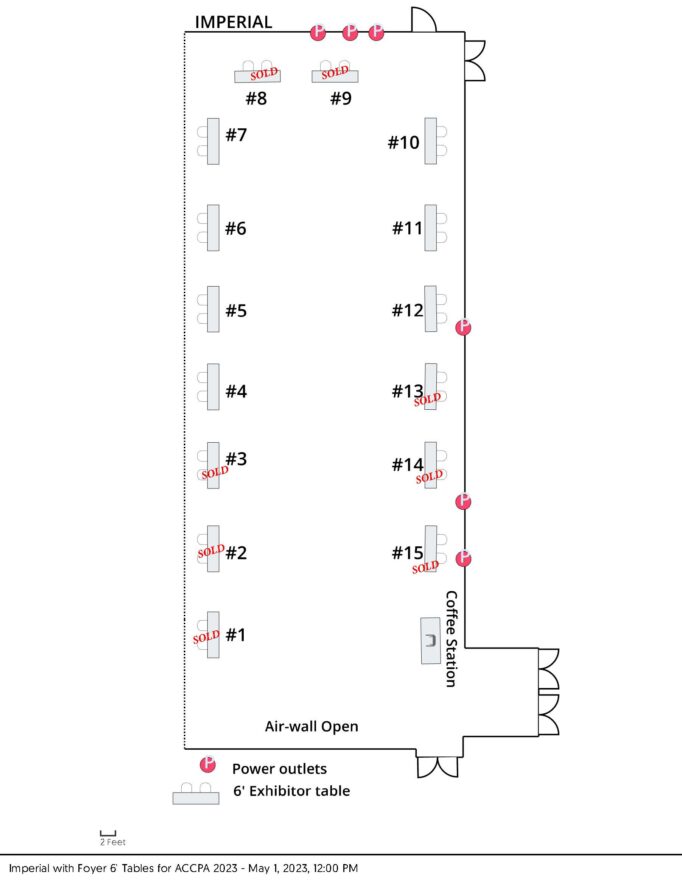
NETWORKING NEXUS
Created in response to Delegates’ requests for more networking opportunities. You don't want to miss this!

TUESDAY, MAY 2, 2023 7-11PM AT THE TOP OF THE INN
Join us from 7:00-11:00PM for the Networking Nexus. Hors d'Oeuvres will be served. A cash bar will be available.
TICKETS $50 per person. One or more tickets may be purchased as part of your registration to the conference or pre-conference. They may also be purchased on-site at the conference registration desk.






